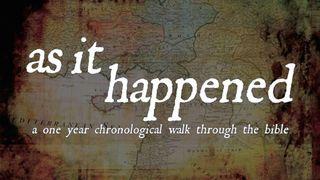Plan info
For The Love Of GodSample

THE THEOLOGICAL POWER OF Isaiah 41 becomes clearer if we grasp something of the underlying history.
In line with the prediction of Isaiah 39:6-7, Jerusalem was finally destroyed in 587 B.C., her temple razed and her people killed or transported. This was the most shattering event Israel faced in Old Testament times. But far from thinking that this proved that God was losing control, Isaiah not only foresaw the event but insisted that it was God’s doing. Now he addresses those who would suffer Babylonian aggression and who would wonder if there was any hope for them at all. Isaiah has already reminded them that as far as God is concerned the nations are no more significant than a drop in the bucket or dust on the scales (Isa. 40:15-17). Now he predicts that God himself will end the aggression of the Babylonian Empire. He will raise up the Persian king Cyrus (Isa. 41:2-4, 25-27; Cyrus is actually named in Isa. 44:28; 45:1).
Cyrus, king of the Persian city of Anshan, ascended to power in 559, when Persia was still subject to Media. Ten years later he killed the Median king Astyges and founded the Persian Empire. In less than a decade, he subdued territory to the west as far as modern Turkey (conquering the legendary King Croesus on the way), and to the east as far as northwest India. Babylon fell in 539. Cyrus reversed the policy of previous empires. Far from transporting subdued peoples, he encouraged exiles to go home—including Israel (Ezra 1:2-4; see meditation for January 1).
Isaiah 41, then, makes two important points. First, God alone is the One who summons nations before him, controlling their destinies, calling on them to accomplish his will—and this includes Cyrus, whom God has “stirred up” for the tasks allotted him. Where is the evidence of this bold claim? It is found in the fact that God predicts the entire sequence of developments a century and a half in advance (Isa. 41:21-29). This is something the pagan idols could not possibly do. “See, they are all false! Their deeds amount to nothing; their images are but wind and confusion” (Isa. 41:29). Such predictions are the exclusive domain of “Jacob’s King” (Isa. 41:21), for he alone writes history in advance. Second, Israel must understand that they are collectively God’s servant (Isa. 41:8-20), the descendants of Jacob and of Abraham before him, themselves the servants of God. None of this means that they are intrinsically great: God addresses them as “O worm Jacob, O little Israel” (Isa. 41:14). But they do have a great God, their Redeemer, the Holy One of Israel (Isa. 41:14). They may abandon fear (Isa. 41:10) and rejoice in him (Isa. 41:16).
About this Plan

A daily devotional for discovering the riches of God's word: For the Love of God is a daily devotional designed to walk a person through the Bible in a year while assisting the reader in discovering the riches of God's W...
More
We would like to thank The Gospel Coalition for providing this plan. For more information, please visit: thegospelcoalition.org









